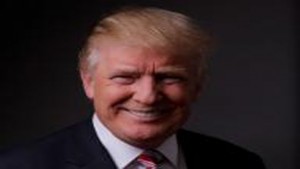 COLUMBUS, United States (AFP) — Donald Trump yesterday said he would accept a “clear” presidential election result but reserved the right to launch a legal challenge, casting the United States into uncharted political waters and his campaign deeper in disarray.
COLUMBUS, United States (AFP) — Donald Trump yesterday said he would accept a “clear” presidential election result but reserved the right to launch a legal challenge, casting the United States into uncharted political waters and his campaign deeper in disarray.
As Trump’s closest allies scrambled to row back debate-stage remarks that called into question the peaceful transfer of power, the 70-year-old populist dangled conditions for his acceptance.
“I will totally accept the results of this great and historic presidential election… if I win,” the Republican nominee told cheering supporters in Delaware, Ohio.
“Of course I will accept a clear election result, but I will also reserve my right to contest and file a legal challenge in the case of a questionable result.”
“I will follow and abide by all of the rules and traditions of all of the many candidates who have come before me,” he added.
The final 2016 presidential debate on Wednesday was dominated by Trump’s refusal to say he would recognise a victory by Democrat Hillary Clinton, 68, who he accuses of conspiring to rig the vote against him.
That stance is unprecedented in modern US political history and has elevated fears of post-election unrest.
Although Trump looks set to lose the election — his campaign sent into a tailspin by a stream of allegations of sexual misconduct — he is likely to garner as many as 50 million votes.
How his supporters react is now foremost in the minds of officials in the White House and beyond.
It is unclear what impact Trump’s stance will have on the election itself.
“Calling an election rigged doesn’t just undermine foundational democratic norms and principles, it also reduces voter engagement,” said Adam Seth Levine, a professor of government at Cornell University.
The campaign between Trump and Clinton has proven to be the caustic soda to decades of partisan rancour in Washington.
Political tribalism has already caused gridlock in government and eroded democratic institutions from the Supreme Court to Congress.
But despite isolated allegations of voter fraud, controversy over the tight 2000 vote and rampant gerrymandering, US elections have been regarded as free and fair.
Asked point-blank by a debate moderator on Wednesday whether he would accept the election result if he lost, the reality television star shattered that consensus.
“I’ll look at it at the time. What I’ve seen is so bad,” he said, repeating unfounded allegations of vote rigging.
Asked again by the moderator, Trump said “I’ll tell you at the time. I’ll keep you in suspense, OK?”
His rival on the debate stage, and a phalanx of his fellow Republicans rushed to tell Trump it was not “OK”.
Clinton declared herself “appalled” by what she said was an attack on 240 years of US democracy.
Trump’s vice-presidential running mate Mike Pence insisted, “we’ll accept the will of the American people”.
Reince Priebus, the chairman of the Republican National Committee, offered assurances. “Barring massive voter fraud, of course he is going to accept the results of the elections,” he said.
But Republican Senator Jeff Flake said Trump was “beyond the pale” and onetime presidential candidate Senator Lindsey Graham said if Trump loses, it will be “because he failed as a candidate”.
Trump and Clinton yesterday attended the same annual charity dinner in New York — an event where the candidates traditionally engage in a “friendly roast.”
But the animosity between them seems almost certain to get in the way.
They would not even shake hands at Wednesday night’s debate, and at one point Trump interrupted Clinton to call her “a nasty woman”.
Clinton, who is vying to become the first woman president of the United States, told reporters she was “both relieved and very grateful” that the debates were now behind her.
Polls show her leading by more than six points and making gains even in states like Arizona, Texas and Georgia that have long been in the Republican column.
